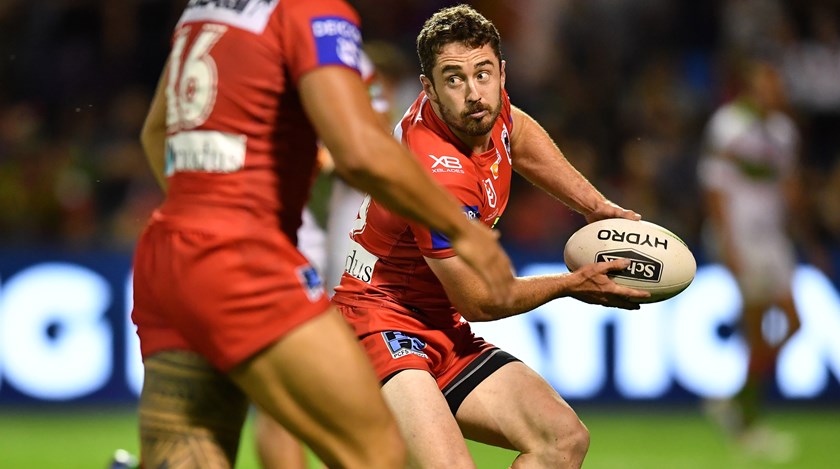Opinion
McGregor's deal was bad, but bringing Flanagan back early would be worse
Darren Kane
Sports Columnist
Send via Email
Even if the Dragons did decide McGregor was so in demand he must be tied down on a long-term deal, surely the stinger is fiction: that the deal is structured so the club has no meaningful early termination rights, aside from paying out the whole of his salary for the rest of his deal should he be axed.
Surely nobody possessed of all their working faculties would agree to such a ridiculously unbalanced contract? At best it's very poor judgment for a board to agree that the highest-paid non-playing employee of a professional sporting franchise should have no performance-based ‘big sticks’ inserted into his or her employment contract, with which their employer can whack them to the point of early termination.
If the deal the Dragons have employed McGregor on is actually a fixed-term contract, with no employer-based early termination rights linked to chronic poor team performances, then three conclusions are compelling.
Firstly, management of the St George Illawarra business circa 2019 was a calamity.
Secondly, this year the Dragons face a Buridan’s ass of a dilemma (Google it).
Thirdly, McGregor has missed his calling. He should be negotiating world peace for the UN.

Coach Paul McGregor faces an uncertain future at the Dragons.Credit:AAP
The Dragons could win their next seven matches and the management who signed the deal would be hailed as geniuses. But if that doesn't happen - and it’s hardly likely - there’s one solution which is no solution at all.
Dragons assistant coach Shane Flanagan cannot be the answer to the conundrum of how to punt one coach and yet not pay for another. Not under any circumstances.
It’s unfathomable how it could be even jokingly speculated on - let alone reported - that the NRL has left the door ‘ajar’ for Flanagan to return to a head coaching role, possibly as early as this season.
If the NRL stands for anything, it must stand for the integrity of its own decision making. In September 2019, the governing body announced Flanagan - who had been deregistered by the NRL after breaking the rules of a suspension in 2014 - would be eligible to work as an assistant coach for seasons 2020 and 2021. The Dragons swiftly snapped up his services.
Indeed the NRL’s statement in September 2019 concluded by saying: “Mr Flanagan has been told the NRL will give no consideration to expediting his return to a head coaching role beyond today’s decision."
If the NRL is now contemplating the idea of abandoning its own clear stance, for any reason, then maybe wresting ‘rugba league’ from the clutches of COVID-19 wasn’t such a stellar idea after all.
Sanctioning such backflips shouldn’t occur in any sport. Even if it was accepted practice in rugby league, Flanagan isn’t a candidate to be a beneficiary of such leniency.

Shane Flanagan is banned from NRL head-coaching roles until 2022.Credit:AAP
Of course, a position so vehemently expressed demands explanation. In the week prior to Christmas in 2018, the NRL announced it intended to cancel Flanagan’s registration; saying registration was a prerequisite to him being employed as an NRL head coach. The next month, Flanagan resigned as head coach of the Cronulla Sharks.
The reason for his deregistration in 2018 was it was discovered by the NRLthat Flanagan had ignored the conditions of a previous ban imposed by the NRL in 2013. That sanction demanded Flanagan have nothing to do with the Sharks in 2014 as part of a one-year suspension from all involvement in rugby league.
At this point, if you’ve taken away not much else, at least note Flanagan was suspended for a year and responded by flagrantly ignoring that ban. The NRL responded by deregistering him, before partially capitulating in September last year.
Why was Flanagan suspended in 2013? These matters strike at the core of the responsibilities and obligations of a head coach, in any professional sport. In 2013 the NRL - following prolonged investigations - made serious findings about a Sharks regime of administering substances and supplements to players, who were exposed to potential health risks.
Regarding Flanagan, the investigation determined he had failed to ensure a safe and healthy work environment; he had failed to properly supervise senior staff; he had failed to take appropriate action to combat unsafe practices; and that he had failed to ensure his staff did not intentionally bypass the club’s medical staff.
To illustrate what those NRL findings mean in context, one must turn to a judgment delivered in the Supreme Court of NSW in March 2016 in a defamation case brought by Stephen Dank against a multitude of defendants, including yours truly. The judgment concerned an amalgam of six different defamation cases, all commenced by Dank in relation to the media’s reporting on his role in doping and duping several Australian athletes.
In those proceedings, a Supreme Court jury found the various publications on which Dank sued conveyed specific imputations, including:
- Dank had administered drugs to players, and such drugs that were banned in sport by the World Anti-Doping Agency
- He administered dangerous and cancer-causing supplements to players
- Dank’s conduct in administering those substances to footballers was indefensible
- That he acted with reckless indifference to the life of one Sharks player because he administered untested substances to the player while in remission from cancer
- And that Dank accelerated that player’s eventual death from cancer.
Succinctly put, there has been no greater abhorrence inflicted, in the history of Australian sport, than the disaster orchestrated by Dank. The prolonged disregard he displayed, for the safety and welfare of athletes who misguidedly placed their trust in him, is breathtaking.
The head coach, under whose supposed supervision Dank worked for the Sharks in that period in 2010-11, was Flanagan. Flanagan's culpability for Dank's wrongdoing is limited to the NRL's findings noted above.
Almost all people deserve second chances; maybe even third chances. None of what I have said should be interpreted as an attempted character assassination on Flanagan and his career prospects. If a head coaching role presents itself for his acceptance in 2022, so be it.
However, it would convey a categorically wrong message on every level should the NRL waive the already lenient sanctions imposed on Flanagan.
And if the NRL commuted his unserved sentence simply because the Dragons see him as an inexpensive solution to a coaching dilemma: well that would be dastardly.
https://www.smh.com.au/sport/nrl/mc...ack-early-would-be-worse-20200605-p54zv0.html




 Robb Cox/NRL Photos
Robb Cox/NRL Photos